| Reviews & Columns |
|
Reviews DVD TV on DVD Blu-ray 4K UHD International DVDs In Theaters Reviews by Studio Video Games Features Collector Series DVDs Easter Egg Database Interviews DVD Talk Radio Feature Articles Columns Anime Talk DVD Savant Horror DVDs The M.O.D. Squad Art House HD Talk Silent DVD
|
DVD Talk Forum |
|
|
| Resources |
|
DVD Price Search Customer Service #'s RCE Info Links |
|
Columns
|
|
|
Great Italian Directors Collection
THE MOVIES:
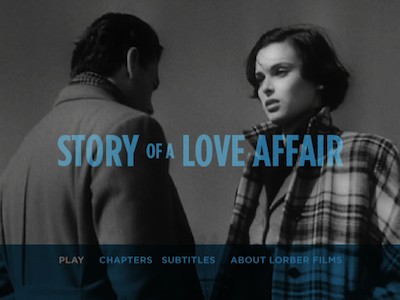
"Great Italian Directors" is certainly a wide category worthy of exploration. Italy has given us a large number of influential directors over the last sixty or seventy years, you could put together a seemingly endless combination of films and filmmakers. This boxed set--titled, simply enough, the Great Italian Directors Collection--limits the focus in some ways that make a lot of sense--the films here are from a specific time period, represent the vanguard of Italian cinema between 1950 and 1966 (the release dates on the three films include), and feature five artists from the period who were at least simpatico enough to have been gathered by producer Carlo Ponti to assemble them for an anthology project. I suspect, though, that the main reason is more practical, if not more arbitrary: two of the films in the boxed set have also been recently released by the company as separate editions, and likely the third will follow. So, why not create a convenient bundle for cinema fans who might want the full trio?
The movie that so far does not have a separate release is the oldest of the set, and kind of the odd man out in terms of style and presentation--it's more serious, and it's also black-and-white. It is Story of a Love Affair, the debut feature from Michelangelo Antonioni. It was made in 1950, a full decade before Antonioni would revolutionize cinematic language with L'Avventura. His first effort is far more straightforward than what was to come, blending a Visconti-esque aristocratic romance with a pulp magazine plot.
An older, wealthy businessman (Ferdinando Sarmi) has discovered Paolo (Lucia Bosé), his wife of seven years whom he married when she was only 20 years old, has a cache of photos from her life before they met. Concerned that she has some secret love in her past, and jealous that this love may also exist in her present, the man hires a private detective to write up a dossier on Paolo. Ironically, she is faithful, but the nosy gumshoe digs up too much about her past and, as a result, seriously jeopardizes Paolo's fidelity. Guido (Massimo Girotti), her lover from her hometown, finds out what is going on and travels to Milan looking to warn his old flame.
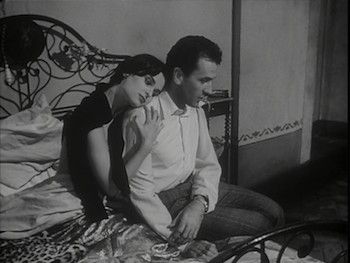
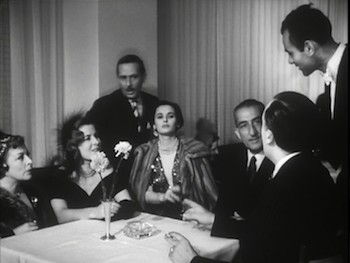
Before Paolo moved away seven years ago, she and Guido were part of a love triangle involving one of her best friends. This other woman, Guido's fiancée, fell down an elevator shaft with both of them there. Neither is quite clear on what happened. Did one or the other see the empty shaft and say nothing to stop her, or were they both blind? Fearing that their relationship would cast further suspicion on them, Guido and Paolo split, and they hadn't seen each other since. Had the jealous husband left everything where it was, the separation would have probably been permanent.
Antonioni tells his story in a fairly straightforward manner, with one foot in the neorealist tradition forged in post-War Italy and the other in something more akin to a melodramatic Hollywood thriller. There is not a lot of heat in his presentation, and most of the passion in the story remains under the surface. Physical contact is dangerous when you suspect you're being watched. Most of the rendezvous between Guido and Paolo happen out in the open, in places where two people talking can be perceived as strangers. This is also where we see the class distinctions that divide them. Guido is a poor working stiff and reluctant to take the kept woman's charity, no matter how easy it is for Paolo to deliver. She wears gowns; he wears well-worn overcoats. He lives in one room; she lives in a sprawling apartment. Ultimately, he will see she doesn't have the stomach for his world; she isn't that self-aware. Their floundering schemes and the ironies that arise from them lead to a fantastic ending that hits with a quiet, yet devastating, impact.
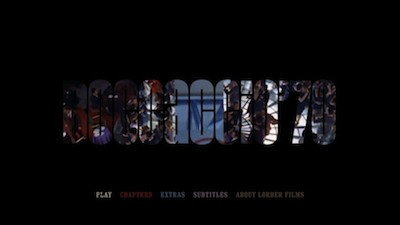
Antonioni was not a part of the next film in the set, and twelve years actually separate the releases. The concept behind Boccaccio '70 is a bit of a brain twister. Producer Carlo Ponti commissioned four of Italy's top directors to make a quartet of stand-alone short films centered around the broad theme of love and morality in the modern age. The approach was meant to call to mind The Decameron, a classic collection of tales with similar narrative concerns. Made in 1962, it was called Boccaccio '70 presumably because it was meant to show a progressive image, a suggestion of what relationships would be like in the far-flung future of eight years from release date. Presumably.
Regardless of intent, the finished product is an entertaining sampler of the best that Italian cinema had to offer. Boccaccio '70 is alternately serious and fun--literally, two of the movies are dramatic, the other two comedic, though all are poignant and have something to say. Each segment clocks in at around 50 minutes, making Boccaccio '70 over three hours in total. The filmmaking styles are different, but somehow cohesive. Despite each director putting his signature on his effort, Boccaccio '70 still looks like it was spawned from the same impulse.
And oh, what brilliant and impulsive directors they are: Mario Monicelli (Big Deal on Madonna Street), Federico Fellini (8 1/2), Luchino Visconti (Senso), and Vittorio De Sica (Bicycle Thieves). Each had chronicled interpersonal relationships in their previous work, though with different hues--Monicelli's using satire to comment on class politics, Fellini positioning old morality against modern freedoms, Visconti's ever-present austerity, De Sica turning a sex-comedy into social commentary--and those hues still shine through even in a group effort such as this. It's all clever, funny, and romantic, and even a little heartbreaking. Each director delivers a strong entry, no one here really falls down on the job.
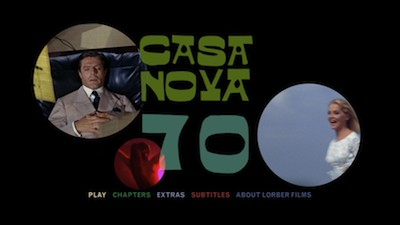
That said, Monicelli probably delivers my favorite segment, "Renzo and Luciana," a tale of young love and the foolishness it often causes. The story is romantic with light comic touches. Too bad his full-length entry in the Great Italian Directors Collection is the weakest in the set.
Released in 1966, Casanova '70 was conceived (again, presumably) as a modern revision of the classic ladies man of legend. Marcello Mastroianni ably steps into the role of the army officer who can't enjoy sex unless he first is turned on by an element of danger. Public places are a good start, though the more extreme, the better. Of the escapades we see, he pretends to be a doctor to check the health and purity of a Sicilian girl on her wedding day, and he also goes to a prostitute reputed to be a jinx. His only serious romantic interest is the chaste Gigliola (Verna Lisi), whom he can't touch. On the other end of the spectrum, he is lured in by a statuesque trophy wife (Marisa Mell) who wants the loverman to kill her abusive husband. He just wants to get busy with her while the very jealous, violent spouse is still alive. The man is no good to him dead!
Casanova '70 is visually bawdy, though honestly, kind of tame in terms of story--at least by our standards. Aldo Tonti's photography is certainly colorful and easy to look at, though the parade of gorgeous conquests that Monicelli puts together for his star is even easier on the eyes. For admirers of 1960s style and of beautiful women, then there is much to feast on here; even as the somewhat predictable comedy wanes, you're still likely to be looking at one of those women in her underwear. The rest I could honestly take or leave, it's nicely done but not very energetic. At least until the end. I appreciated the absurd legal trial that Mastroianni must undergo. His previous lovers all appear as character witnesses, including Gigliola, who swears her man is true. It calls to mind the final episode of Seinfeld, when everyone that Jerry and the gang had sinned against during the entire series improbably returns to have their say. Monicelli worked with five other writers on the script for Casanova '70, and I have to wonder if they ever considered structuring the story differently so these delicious bits weren't saved until the end. In the early portion of the film, Mastroianni's character catches us up on his history while on an analyst's couch, but it seems like having the whole affair be recounted in court could have spiced up the languid pacing.
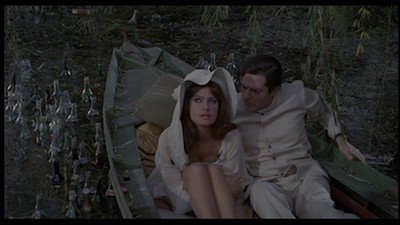
[Note: If you are interested in a longer version of my review of Boccaccio '70, you can read my write-up of the Blu-Ray. You can also take a gander at Christopher McQuain's full essay on the Casanova '70 BD.]
THE DVDc
Video:
It's worth mentioning that Story of a Love Affair and Boccaccio '70 had previously been released by the defunct NoShame label several years back. While Boccaccio '70 has been remastered for Kino's high-definition release, Story of a Love Affair looks to me to be the same transfer as the previous release. The full-frame black-and-white image (1.33:1) is fairly clean, with barely any instances of scratches or damage; it is, however, less than optimum in terms of digital presentation. The image is often soft, with jagged lines showing up in the background and regular instances of ghosting.
Both of the '70 films are delivered in full color, widescreen, at a 1.85:1 aspect ratio, and both fair considerably better than Story. Colors look good, with a nice period grain and balance between the tonal values. There were no noticeable marks or scratches, the source material has held up well.
Sound:
All three movies have a monaural Italian mix with optional English subtitles. Again, Story of a Love Affair suffers the most from a lack of stronger source materials. The soundtrack is hollow sounding with lots of metallic echoes throughout. My ears eventually adjusted, but it was jarring at first and benefitted from some volume modulation.
Boccaccio '70 and Casanova '70 both also have mono mixes, and again, they suffer no problems. The metallic chatter is nowhere to be found, and the volume has solid levels with decent nuance between quiet and loud.
Subtitles on all the movies are easy to read and run at a good pace.
Extras:
The Great Italian Directors Collection comes in a sturdy slipcase and each of the movies are given their own slimline plastic case to fit inside. Story of a Love Affair is a two-disc release, and there are spindles on both the left and right of the case to hold them.
In terms of extras, Boccaccio '70 and Casanova '70 both have trailers and a stills gallery.

The bonus disc for Story of a Love Affair ports over all the extras from the NoShame release. This includes both a poster and a stills gallery, as well as four featurettes. The Identification of a Masterpiece documentary (1 hour, 52 minutes) is the most substantial, though it's a bit dull, consisting entirely of talking heads (mostly assistant director Francesco Maselli) analyzing the film. Likewise, the 28-minute Story of a Peculiar Night shows us happenings around the premiere of the restoration, including Lucia Bosé and a silent, aging Antonioni in attendance. Fragments of a Love Affair is a 5-minute guided tour of Antonioni's Italy (again with Maselli) and the film's locations as they are now, and Restoring a Masterpiece is just as it sounds, clocking in at just over 8 minutes and featuring cameraman Giuseppe Rotunno.
FINAL THOUGHTS:
A bit of a mixed bag here, which is to be expected for a loose collection like this. Boccaccio '70 is the best film of the bunch. The anthology film delivers four excellent stories under one banner, creating its own précis of Italian cinema in the early 1960s. Casanova '70 might have a similar thematic logic, but the full-length story leaves something to be desired. Both of these are available as stand-alone releases, meaning the only exclusive to the Great Italian Directors Collection is Story of a Love Affair, Michelangelo Antonioni's debut. It is kind of odd movie out, as it's far more serious and also in black-and-white. I liked it a lot, and were it down to wanting to have it and Boccaccio '70, as a consumer I would probably splurge and go for the set. If two out of three also doesn't seem bad to you, and you've weighed your other options, then definitely the 3-disc Great Italian Directors Collection is Recommended.
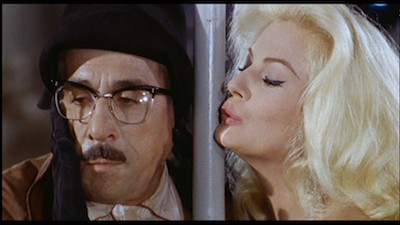
Jamie S. Rich is a novelist and comic book writer. He is best known for his collaborations with Joelle Jones, including the hardboiled crime comic book You Have Killed Me, the challenging romance 12 Reasons Why I Love Her, and the 2007 prose novel Have You Seen the Horizon Lately?, for which Jones did the cover. All three were published by Oni Press. His most recent projects include the futuristic romance A Boy and a Girl with Natalie Nourigat; Archer Coe and the Thousand Natural Shocks, a loopy crime tale drawn by Dan Christensen; and the horror miniseries Madame Frankenstein, a collaboration with Megan Levens. Follow Rich's blog at Confessions123.com.
|
| Popular Reviews |
| Sponsored Links |
|
|
| Sponsored Links |
|
|
| Release List | Reviews | Shop | Newsletter | Forum | DVD Giveaways | Blu-Ray | Advertise |
|
Copyright 2024 DVDTalk.com All Rights Reserved. Legal Info, Privacy Policy, Terms of Use,
Manage Preferences,
Your Privacy Choices | |||||||














